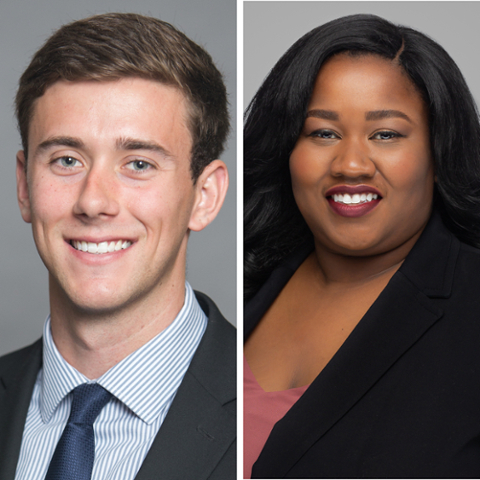Published on March 11, 2021 by Morgan Black

Gabe Tucker and Jennifer Townsend are some of the first law students to participate in Cumberland's new clinics.
Despite hurdles caused by COVID-19, Samford University’s Cumberland School of Law has successfully launching four real-world legal clinics for its students during the 2020-21 academic year. In fall 2020, the Cumberland Veterans Legal Assistance Clinic and the Cumberland Innocence Clinic were launched, and this spring, the law school also started a Capital Defense Clinic and a Criminal Appeals Clinic. These clinics have not only been initiated in the midst of a global pandemic, they have thrived.
“Cumberland’s clinics are another opportunity for our students to apply the law they are learning to real-world issues. The clinics make the law tangible, and our students are getting experience working within and having an impact on their communities,” said LaJuana Davis, professor of law and director of clinics.
Cumberland Veterans Legal Assistance Clinic
The Cumberland Veterans Legal Assistance Clinic (C-VETS), the first of its kind in the state of Alabama, provides free legal assistance to veterans and their families. Through the program, led by U.S. Marine Corps veteran Judge John L. Carroll, law students have the opportunity to consult with real clients under the supervision of licensed attorneys. Wilson Meyers ’80 serves as an adjunct professor in the clinic. Since launching in September, the C-VETS attorneys and student advocates have expanded their original reach of serving the eight-county region of North Central Alabama to serving the entire state of Alabama. Through their work, students have been introduced to organizations such as Still Serving Veterans, the Central Alabama Veterans Collaborative and the Alabama Department of Veterans Affairs.
Students and C-VETS attorneys have worked on a wide variety of legal matters, including wills and estates, family law issues, landlord-tenant issues and consumer credit issues. They have also been able to represent veterans in some municipal court matters, as well as help them with the restoration of voting rights and pardon issues. “We have had several of our cases successfully resolved, and the students in our clinic have been phenomenal,” Carroll said.
Gabe Tucker, a third-year student whose father is a U.S. Navy veteran, immediately knew he wanted to be a part of the new clinic. For his first case, he helped a veteran eliminate $1,000 in municipal court fines. He said, “Through C-VETS, we’ve been able to apply the theory we learn in class in a practical way to see what legal outcomes really look like. Cumberland already does a great job of providing real-world opportunities, but this experience has taken it to a whole new level. It’s been a truly humbling and gratifying experience to be able to be a source of comfort for our country’s veterans while helping them with their legal issues. I look forward to supporting the clinic in any way that I can after graduation.”
The clinic has been generously supported by Cumberland alumnus and veteran Stephen B. Moss ’68, and a grant from The Veterans Consortium Pro Bono Program in Washington, D.C.
Cumberland Innocence Clinic
The Cumberland Innocence Clinic focuses on helping exonerate persons convicted of crimes they did not commit. The clinic provides students the opportunity to research, investigate, and help litigate cases in which there is compelling evidence of innocence. Twenty-five students (and counting) have worked on cases this year, screening and evaluating innocence claims of people incarcerated in Alabama prisons, engaging in intensive investigation work and legal research projects, and even drafting post-conviction pleadings in preparation for eventual litigation in some cases.
Third-year student Jennifer Townsend said, "I could go on forever about the Innocence Clinic and the clinics in general. The Innocence Clinic has been the highlight of my time at Cumberland. Participating in this clinic has allowed me to learn practical skills and become a stronger advocate while working to (hopefully) reverse a wrongful conviction."
The work of this clinic is made possible through a partnership with the Georgia Innocence Project (GIP) and the guidance of Meagan Hurley, GIP’s Alabama fellow attorney.
Capital Defense and Criminal Appeals Clinics
The newest programs added to Cumberland’s clinical offerings are the Capital Defense Clinic and the Criminal Appeals Clinic. Both are hosted by the Jefferson County Public Defender’s Office, a state agency that represents indigent defendants in capital and noncapital cases at trial and on direct appeal. Adam Danneman, the Jefferson County public defender, was integral in conceptualizing both clinics. In the Capital Defense Clinic, students are working with deputy public defender Sammie Shaw on capital cases and polishing relative skills such as interviewing, drafting motions, and preparing mitigation for the capital sentencing phase of a trial. The Criminal Appeals Clinic is headed by Alisha McKay, appellate attorney for the Jefferson County Public Defender’s Office, who is teaching students to draft appellate briefs and related pleadings for real clients. Students are learning substantive law and procedure and the lawyer’s true skill in applying the law for the best results for a client.
“Like other ventures that started in 2020, the global pandemic and economic crisis affected us, making us especially grateful for support from our Cumberland and larger legal communities,” Davis said. “Much of the credit for the clinics’ existence goes to our students, who advocated for the clinics in summer 2020.”
To learn more about or to provide support for Cumberland School of Law’s clinics, please email clinics@samford.edu.
Samford is a leading Christian university offering undergraduate programs grounded in the liberal arts with an array of nationally recognized graduate and professional schools. Founded in 1841, Samford is the 87th-oldest institution of higher learning in the United States. Samford enrolls 5,791 students from 49 states, Puerto Rico and 16 countries in its 10 academic schools: arts, arts and sciences, business, divinity, education, health professions, law, nursing, pharmacy and public health. Samford fields 17 athletic teams that compete in the tradition-rich Southern Conference and ranks 6th nationally for its Graduation Success Rate among all NCAA Division I schools.
